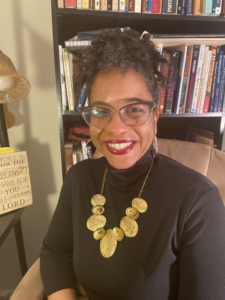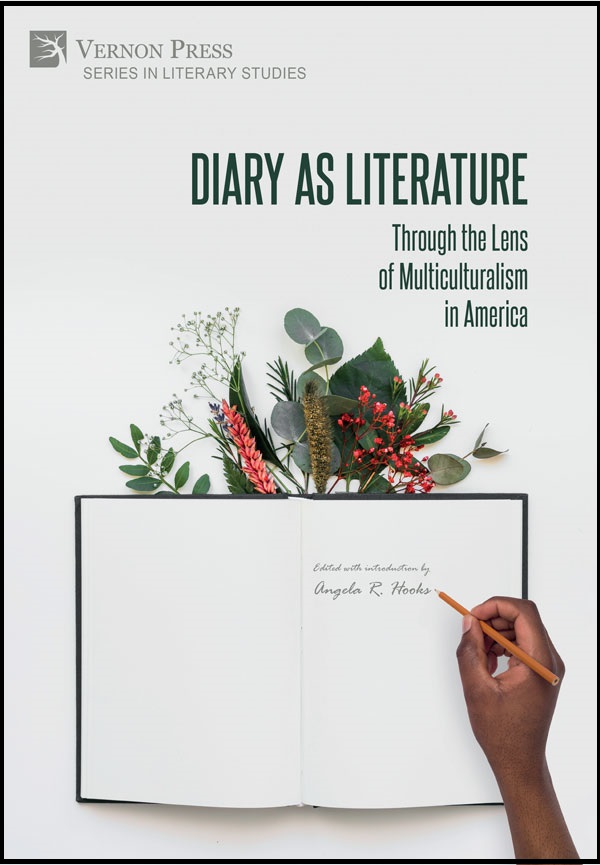Dr. Angela Hooks edited a recently published anthology entitled Diary as Literature Through the Lens of Multiculturalism in America. Hooks writes about her passion for the diary and its value in literary scholarship, specifically as a way to expand scholarship about people who have been marginalized. Another one of her essays, entitled “Bringing the Diary into the Classroom,” was published in the peer-reviewed journal Currents in Teaching and Learning.
 My passion for diary writing transformed when I wanted to read the inner lives of diary writers who looked like me. During my research for African American diarists, I became fascinated with the genre of diary writing as a whole and in all forms: autobiography, memoir, letters, travel writing and novels, poems, and short stories. As a result, I was able to bring the concept into the classroom teaching both African American literature and multiculturalism in America through the lens of the diary.
My passion for diary writing transformed when I wanted to read the inner lives of diary writers who looked like me. During my research for African American diarists, I became fascinated with the genre of diary writing as a whole and in all forms: autobiography, memoir, letters, travel writing and novels, poems, and short stories. As a result, I was able to bring the concept into the classroom teaching both African American literature and multiculturalism in America through the lens of the diary.
Diaries may not seem to conform to literary expectations such as meandering plots, dead ends, and repetition; however, they manage to engage the reader, arouse empathy and elicit emotional responses that many may be more inclined to associate with works of fiction. Blurring the lines between literary genres, diary writing can be considered a quasi-literary genre that offers a unique insight into the lives of those we may have otherwise never discovered.
Therefore, curating and editing the recently published anthology, Diary as Literature Through the Lens of Multiculturalism in America (2020) expands the historically marginalized voice, illustrating how diary-keepers explore their identity and understand themselves, their relationships, and the world around them using the diary. Both creatives and scholars write about the lives they discovered in the pages of diaries.
Paige Mason, a doctoral student at Ohio University, writes about Lucius Clark Smith a nineteenth-century, teacher and farmer. Paige Mason looks at the historical conversation about labor, the Midwest, and vocation in Smith’s diary in her essay “A Lifetime of Sowing the Blues: Lucius Clark Smith: 1834-1915.” His diary entries reflect musings about the livelihood of soldiers with little interest in being a soldier. Instead, he chronicles his failures as a businessman and farmer along with his father’s travels.

Corey Greathouse, Associate Professor at Austin Community College, explores the emotional rollercoaster penned in William B. Gould’s diary in “Using Personal Diaries as a Site for Reconstructing African American History.” Greathouse notes that Gould’s diary has a “range of emotion that makes his writing an essential resource in reconstructing the lives of enslaved people.”
Not only does this collection of diary voices, side by side, document and demonstrate how social pressures and literary practices affect people despite race, culture, creed, or pedigree; it’s also an interdisciplinary dialogue on all aspects of writing: diaries, letters, autobiographies, and memoirs.
Through letters, Dr. Aisha Z. Cort, a lecturer at Howard University, pieces together “the fragments of her mother’s past with archival research and family interviews” in her personal narrative, “The Lost Girl of Havana: A Tale of Afro-Cuban Diasporic Memory.” Like the diary, the letter serves as an act of writing, and in that act, the letter writer like the diarist wishes “to rewrite themselves.”
This collection shows how the diary evolved and continues to evolve while remaining the same: space where one can reflect on the innermost part of themselves narrating ‘real fiction’ about their lives. Reading other people’s diaries can feel invasive and judgmental, but the contributors to this collection delicately peer through diary pages exploring and examining complications, aha moments and catastrophes of men and women, ordinary people and celebrities alike.
Twelve voices, both academic and creative, analyses diary writing in its many forms from oral diaries and memoirs to letters and travel writing in the multi-author anthology. Based on the diary, the contributors of Diary as Literature write about multiculturalism and intercultural relations during the Civil War experienced by African-Americans and Irish-Americans soldiers, through the lives of Afro-Cuban diaspora, within a New Englander’s cultural clash in the Appalachia, the hardships of a Bengali immigrant in New York City, and the “racial barriers as a false social construct to create multicultural identities.”
Because Diary as Literature Through the Lens of Multiculturalism in America blurs the genre line it is divided into three sections: Diaries of the American Civil War, Diaries of Trips and Letters of Diaspora, and Diaries of Family, Prison Lyrics, and a Memoir. The contributors bring a range of expertise including comparative and transatlantic literature, composition and rhetoric, history, women, and gender studies.
When writing the introduction, I attempted to give a brief history of the diary and how it evolved over four centuries in America from spiritual matters of clergy to introspection of the ordinary person. Thomas Mallon, author of A Book of One’s Own People and Their Diaries, explains the diary began with the late sixteenth century reformed clergyman in East Anglican as a means of magnifying godliness, examining their conscience, and preparing for an encounter with God in prayer and communion.[i] Evidence points to East Anglicans exchanging diaries with Puritan for edification of each other, a Christian principal throughout the Holy Writ. The exchange of diaries for edification shifted to a Protestant art form during the mid-seventeenth century. The Non-Conformist charted their spiritual progress in the diary as a space for self-discipline, self-judgement, and self-watching purposes. Therefore, when the practice came to America the habit of diary keeping was no longer confined to the clergy but practiced by lay people, settlers, free, and enslaved Black Americans — people who wanted to discover who they really were, their inner lives. The diary evolved into what journal guru Ira Progoff described as a space to gain awareness about diverse areas of your life, connect to the real self, making possible our subjective experiences.
The idea to curate this book derived from a roundtable discussion at the 2019 NeMLA Conference and a course of the same name that I taught at Ramapo College of New Jersey. For more than three decades I have maintained a diary and since 2002 have led diary writing discussions and workshops in the community, college classrooms, and churches.
To read a sample chapter go to https://vernonpress.com/book/656.
Dr. Hooks is the recipient of the 2020 Princeton Theological Seminary Francis Grimke Scholarship Award where she will pursue a Masters in Divinity. She earned her doctoral degree in English Literature from St. John’s University, and her MFA from Manhattanville College in Purchase, NY.
Disclaimer: The views and opinions expressed on our blog do not necessarily reflect the views or position of Maryland Humanities or our funders.

